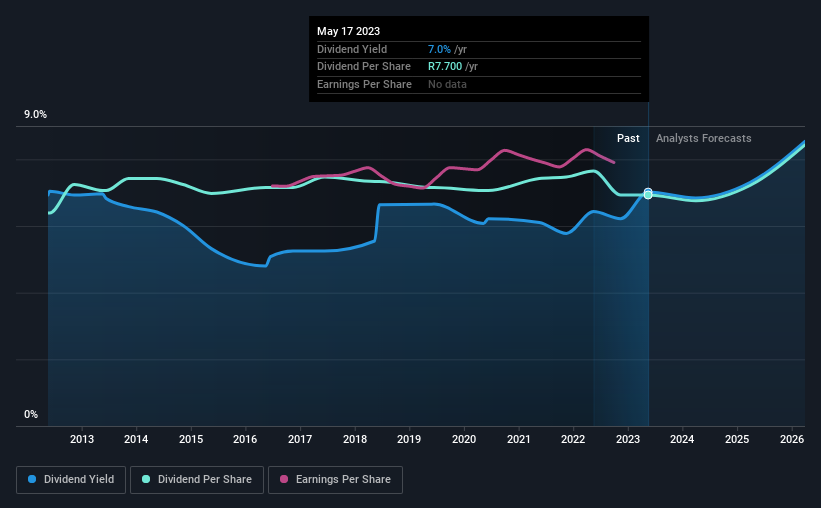
Vodacom Group Limited (JSE:VOD) has announced it will be reducing its dividend payable on the 26th of June to ZAR3.30, which is 23% lower than what investors received last year for the same period. However, the dividend yield of 7.0% is still a decent boost to shareholder returns.
See our latest analysis for Vodacom Group
Vodacom Group's Earnings Easily Cover The Distributions
While it is great to have a strong dividend yield, we should also consider whether the payment is sustainable. Prior to this announcement, Vodacom Group was paying out 80% of earnings and more than 75% of free cash flows. This indicates that the company is more focused on returning cash to shareholders than growing the business, but it is still in a reasonable range to continue with.
The next year is set to see EPS grow by 8.9%. If the dividend continues along recent trends, we estimate the payout ratio will be 73%, which would make us comfortable with the sustainability of the dividend, despite the levels currently being quite high.

Vodacom Group Has A Solid Track Record
The company has been paying a dividend for a long time, and it has been quite stable which gives us confidence in the future dividend potential. The dividend has gone from an annual total of ZAR7.10 in 2013 to the most recent total annual payment of ZAR7.70. Its dividends have grown at less than 1% per annum over this time frame. Dividends have grown relatively slowly, which is not great, but some investors may value the relative consistency of the dividend.
Vodacom Group May Find It Hard To Grow The Dividend
Some investors will be chomping at the bit to buy some of the company's stock based on its dividend history. Unfortunately things aren't as good as they seem. Vodacom Group hasn't seen much change in its earnings per share over the last five years.
An additional note is that the company has been raising capital by issuing stock equal to 14% of shares outstanding in the last 12 months. Trying to grow the dividend when issuing new shares reminds us of the ancient Greek tale of Sisyphus - perpetually pushing a boulder uphill. Companies that consistently issue new shares are often suboptimal from a dividend perspective.
Our Thoughts On Vodacom Group's Dividend
In summary, dividends being cut isn't ideal, however it can bring the payment into a more sustainable range. The payout levels might be a bit high for our liking, but we can't deny that until now, the payments have been pretty consistent. We would probably look elsewhere for an income investment.
Investors generally tend to favour companies with a consistent, stable dividend policy as opposed to those operating an irregular one. At the same time, there are other factors our readers should be conscious of before pouring capital into a stock. For instance, we've picked out 3 warning signs for Vodacom Group that investors should take into consideration. Is Vodacom Group not quite the opportunity you were looking for? Why not check out our selection of top dividend stocks.
New: Manage All Your Stock Portfolios in One Place
We've created the ultimate portfolio companion for stock investors, and it's free.
• Connect an unlimited number of Portfolios and see your total in one currency
• Be alerted to new Warning Signs or Risks via email or mobile
• Track the Fair Value of your stocks
Have feedback on this article? Concerned about the content? Get in touch with us directly. Alternatively, email editorial-team (at) simplywallst.com.
This article by Simply Wall St is general in nature. We provide commentary based on historical data and analyst forecasts only using an unbiased methodology and our articles are not intended to be financial advice. It does not constitute a recommendation to buy or sell any stock, and does not take account of your objectives, or your financial situation. We aim to bring you long-term focused analysis driven by fundamental data. Note that our analysis may not factor in the latest price-sensitive company announcements or qualitative material. Simply Wall St has no position in any stocks mentioned.
About JSE:VOD
Vodacom Group
Operates as a connectivity, digital, and financial services company in South Africa, Egypt, and internationally.
Good value with adequate balance sheet.


